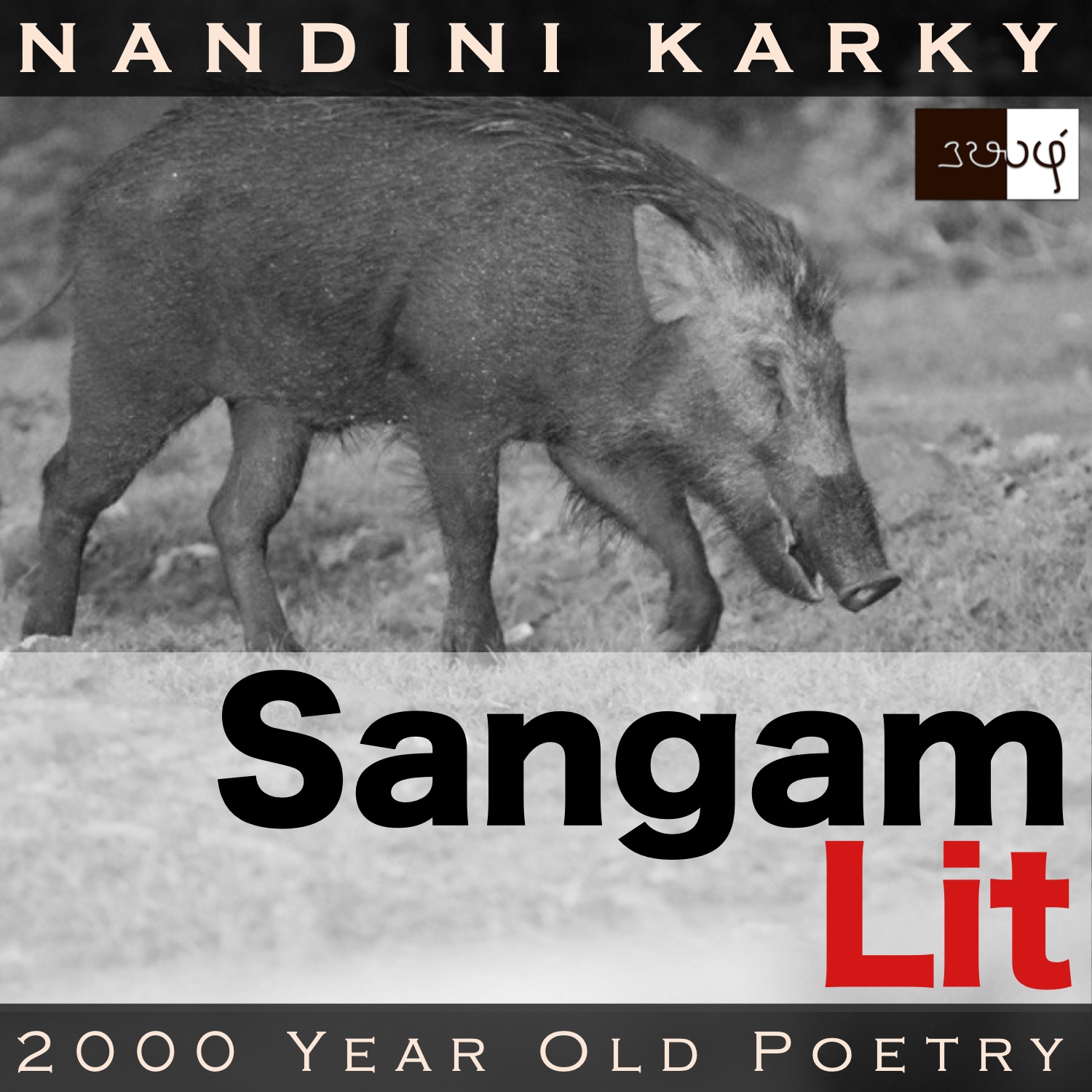Podcast: Play in new window | Download
Subscribe: Apple Podcasts | Spotify | Amazon Music | Android | iHeartRadio | TuneIn | RSS | More

In this episode, we perceive the ways of life depicted in Sangam Literary work, Natrinai 82, written by Ammallanaar, his only Sangam entry. Set in the mountain country of ‘Kurinji’, the poem speaks in the voice of the man to the lady, expressing his feelings, after a covert union with her.
நோயும் நெகிழ்ச்சியும் வீடச்சிறந்த
வேய் வனப்புற்ற தோளை நீயே,
என் உயவு அறிதியோ, நல் நடைக் கொடிச்சி!
முருகு புணர்ந்து இயன்ற வள்ளி போல, நின்
உருவு கண் எறிப்ப நோக்கல் ஆற்றலெனே-
போகிய நாகப் போக்கு அருங் கவலை,
சிறு கட் பன்றிப் பெருஞ் சின ஒருத்தல்
சேறு ஆடு இரும் புறம் நீறொடு சிவண,
வெள் வசிப் படீஇயர், மொய்த்த வள்பு அழீஇ,
கோள் நாய் கொண்ட கொள்ளைக்
கானவர் பெயர்க்கும் சிறுகுடியானே.
The poem opens with plenty of words in the health domain such as ‘நோய்’, ‘நெகிழ்ச்சி’ and ‘உயவு’ meaning ‘disease’, ‘fatigue’ and ‘pain’ respectively. Interesting in that the illness of these Sangam folks all seem to have a mind origin. We hardly see any examples of a fever or a cold but in most poems, they seem to head straight to the mind as the seat of all physical problems. If you think about it, modern science does agree with this ancient hypothesis about the vital place the mind occupies even in physical ailments. A new tree looms above our heads in the word ‘நாகம்’, called as ‘Ceylon ironwood’ and as the name suggests, a tree soaring to over 100 feet with timber, seemingly as strong as iron. Fauna follows in the form of a ‘பன்றி’ or a ‘boar’ as well as ‘நாய்’ or ‘dog’. The phrase ‘கொள்ளைக் கானவர்’ meaning ‘hunting hills-men’ sets the scene of a kill in that hill.
Moving into the meaning of the verse, we find the man has met with the lady, with the help of the confidante. After a union with the lady, he turns to her and says, “O young girl from the hills with a pleasing gait, you are the one with shoulders akin to the beauty of bamboos. The one who causes my affliction and fatigue to fade! Do you understand the immense pain in me? Like Valli who left with her love Murugu, you dazzle my eyes with your beauteous form and I turn helpless in your hamlet in the hills. Here, in the hard path hemmed by the tall ‘naaka’ trees, a small-eyed male boar, full of fury, rolls in the marsh and emerges with sludge covering its dark back. Just then, its feet gets caught in the snare set for it. Hunting dogs then attack and kill the snared boar. Then, the hunters cut the snare’s threads and release the boar to take it to their little hamlet.” With these words, the man expresses his admiration for the lady and also passes on a subtle message, persuading her to elope with him.
Let’s understand the intricacies involved in this terse verse. The man first praises the lady as the one cure for all his pain and distress and then goes on to speak about how he’s so enamoured by her that he turns helpless at the sight of her luminous beauty. He then brings in the reference of ‘Murugu’ and ‘Valli’. Is this a reference to long-lost mythical characters or is it a reference to a leader and his consort, who lived many generations ago? Have stories passed on by word of mouth elevated great mortals to immortal gods? We do not know! But what we can observe is the casual way this verse refers to the god as if talking about a friend. The man equates the lady with Valli and says she was the one who left her home to go away with Murugu. An impressionable mind is indeed open to influence. As we may have seen in our own lives when we catch ourselves identifying with a virtual character and then going on to act like that character in real life, rather than like us. That is indeed the secret weapon in advertising! So, the man pulls up Valli and tells his lady that she’s like Valli too. The man hopes by equating her beauty with that of Valli, the lady will follow suit in actions too.
Following the mythical reference, the man turns to the natural scene to drive his message home. He talks in vivid detail about a boar hunt. A slushy boar easily falls prey in the snare laid for it, perhaps because its small eyes are covered in the mud it was rolling in. Here, we don’t find the hunters using arrows or other weapons to kill it. Instead, dogs pounce on it and kill the snared animal. After which, the hunters release the boar from its snare and take the meat home. The man brings this reference as a metaphor to how if the illness of being apart attacks the lady, he would remove her from the snare of that illness and cure her suffering by taking her to his home. Thus, with this description of the natural world, the man expresses his wish to take the lady away from her home to his own hamlet. By painting a scene of attack, the man shows what lies ahead if the lady just stands helpless in fear and motivates her with the reference to the celebrated Valli and Murugu, to make her go away with him. The verse thus subtly portrays the path to motivation and moving others to action!




Share your thoughts...